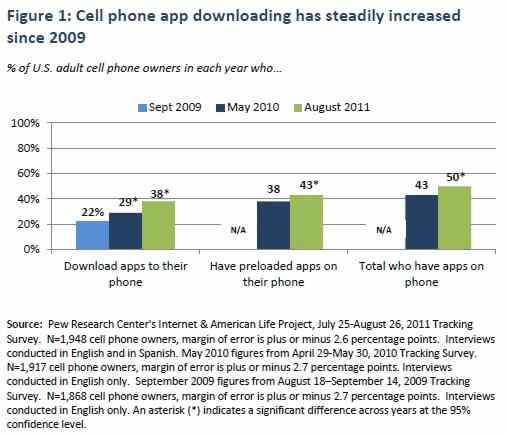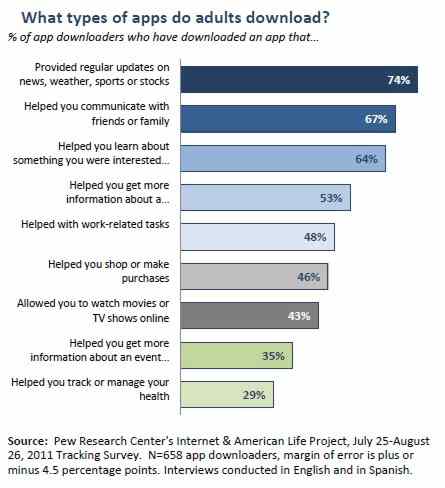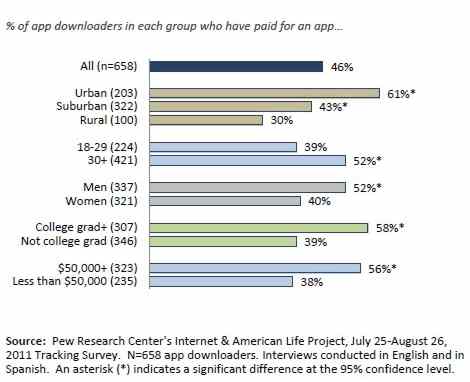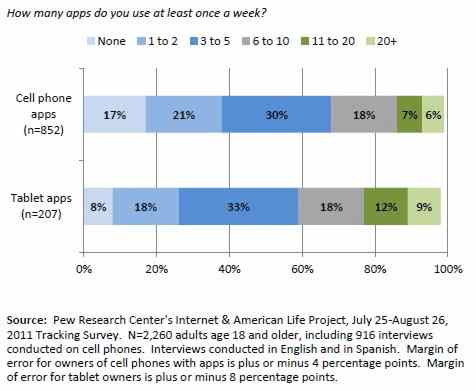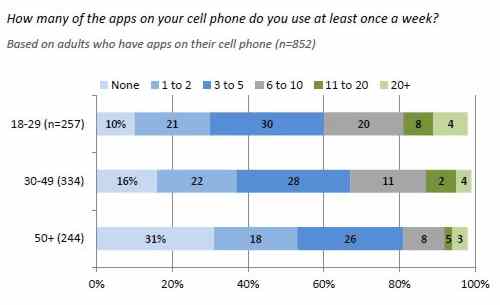| Mobile App Usage Greatest Among Young Adults |
| Written by Janet Swift | |||
| Wednesday, 09 November 2011 | |||
|
Half of U.S. adult cell phone owners have apps on their phones. However, having apps does not necessarily mean using apps so it's important to ask which apps are preferred and how often they are used. When you take into account the proportion of adult cell phone owners who have downloaded an app to their phone (38%) and the proportion who purchased a phone already equipped with apps in the past year (43%), half (50%) of U.S. adult cell phone owners now have apps on their phones.The rate of app downloading has seen a steady increase since 2009.
(click in chart to enlarge)
This result comes from the latest Internet & American Life Project report. The survey, conducted by the Pew Research Center in August 2011, also included questions about mobile app use on tablet computers. It revealed that among the 10% of adults who currently own a tablet, three-quarters (75%) had downloaded apps to their tablet. This translates to 8% of all U.S. adults but as 82% of tablet app downloaders had also downloaded apps to a cell phone there is considerable overlap between the two groups of device owners. The current survey asked the app users (a sample size of 658) if they had ever downloaded nine different types of apps. The most popular were those that provide regular updates about everyday information such as news, weather, sports, or stocks (74%), those that help people communicate with friends and family (67%) and those that help the user learn about something in which they are interested (64%):
(click in chart to enlarge)
The Internet & American Life Project collects a great deal of demographic data which reveals trends in the appeal of different types of app. For instance, African-Americans and young adults are more likely than others to download apps that help them communicate with friends and family. And overall, men are more likely than women to download apps that help them make purchases and those that help with work-related tasks. The new survey also found that among adult cell phone users who have downloaded apps, just under half (46%) have paid for an app at some point; this is unchanged from the 47% of downloaders who said the same in the previous survey (May 2010). This time questions were included on the amount paid for an app. Among those who have paid for apps, half (52%) report that the highest dollar amount they have paid for an app is $5 or less. However, 17% have paid more than $20 for an app. Been willing to pay for apps differed by demographic group.
(click in chart to enlarge) As shown in this chart those most likely to pay for apps are men, adults age 30 and older, college graduates, adults with household incomes of $50,000 or more, and those living in urban communities. Having apps does not necessarily mean using apps. In the May 2010 survey of mobile phone usage Pew showed that only about two-thirds (68%) of adults who had apps on their phones reported actually using them: The current survey asked those who reported having apps on a cell phone and/or tablet computer how many apps they use on each device at least once a week. Among adults who have apps on their cell phone, roughly half (51%) use a handful of apps at least once a week, while 17% report using no apps on a regular basis. Almost a third (31%) could be called app “power users” in that they use 6 or more apps on a weekly basis. Among adults who have a tablet computer, 39% report using 6 or more apps on a weekly basis, while just 8% report using no apps regularly on the device.
(click in chart to enlarge) The survey also found that age is the strongest predictor of app use. The 18-29 age group are not only more likely to download apps, they are also more intense users of the apps they have as show in this graph:
(click in chart to enlarge)
More informationRelated article:
To be informed about new articles on I Programmer, subscribe to the RSS feed, follow us on Google+, Twitter or Facebook or sign up for our weekly newsletter.
|
|||
| Last Updated ( Wednesday, 09 November 2011 ) |
